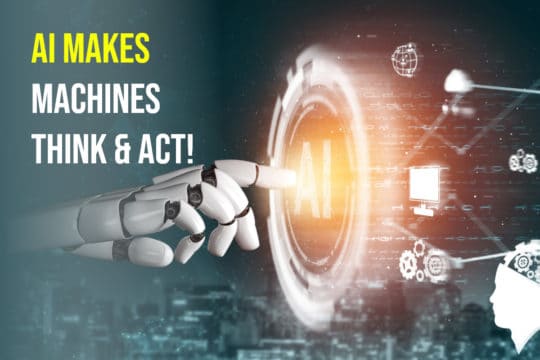ECommerce has been around since the mid-90s, which makes it prevalent for more than twenty-five years. It will not be wrong to say that it has completely changed the way of doing business across the world during this period. Today, even the most unorganized sectors of the world are moving forward to the digitization and online business. So, has eCommerce reached a saturation point?
Many businesses worldwide have taken a step ahead in eCommerce by adapting to machine learning and artificial intelligence (AI). It’s time for businesses to adopt these technologies to increase their profitability and product/service quality.
Current Landscape of ECommerce

As per Statista, In 2019, an estimated 1.92 billion people purchased goods or services online. During the same year, e-retail sales surpassed 3.5 trillion US dollars worldwide. Hence, it is proved that the hold of eCommerce in business activities is significant. It is to be noted that this trend is still growing across the world.
AI and machine learning have been termed as the latest innovations and future growth enablers of eCommerce, and m-commerce (mobile commerce). These are two trends that various research bodies across the world are currently researching. In one of their research, Accenture predicted that by 2035, wholesale and retail industries could experience a profitability boost of 59% because of these two technologies.
In another research by Statista, it has projected that the global artificial intelligence software market will rapidly grow and reach 126 billion US dollars by 2025. This will cover various applications like natural language processing, robotic process automation, and machine learning.
It is currently safe to say that AI & machine learning are the future growth enablers for eCommerce, and online brands must invest in them to be the market leaders of tomorrow.
Recommended for you: When Should You Consider Redesigning Your Online eCommerce Website?
What Aspects AI & Machine Learning Cover?

Till now, in this article, we have proved to you where the future of eCommerce lies. But now, you’ll read about what AI & machine learning exactly are, and their impacts on eCommerce.
Artificial Intelligence

As the name goes, the focus of this technology is on making machines exhibit human behavior. This includes learning, reasoning, sensing, adapting, and more. It’s an umbrella term that covers machine learning. AI builds a system with a comprehensive protocol that allows the machine to learn from the vast set of data it has or has.
As the name goes, the focus of this technology is on making machines exhibit human behavior. This includes learning, reasoning, sensing, adapting, and more. Also, it’s an umbrella term that covers machine learning. AI builds a system with a comprehensive protocol that allows the machine to learn from the vast set of data it had or has.
Artificial intelligence allows a machine to work by itself and also machines to work together. You must be aware of the current emphasis on digitization; in coming years, the same will be laid on smart automation, and that’s how AI will leave a significant mark on the future of eCommerce and m-commerce (mobile commerce).
Along with this, AI can predict and analyze human behavior more accurately. This point has many applications, which we will cover in the later part of the blog.
Machine Learning

As you read above, machine learning is part of artificial intelligence. It inhibits the protocol in machines that allow themselves to expand their knowledge base. With this, it effortlessly examines the huge piles of data in a matter of seconds. Also, the accuracy of the predictions remains intact.
Many big enterprises have incorporated machine learning in their systems to have a vaster and detailed analysis of consumer behavior. With time, its use is being mainstreamed with innovative products and systems. Hence increasing the quality of eCommerce offerings.
Ways AI can be Integrated with Online Shopping

Post pandemic online shopping has been experiencing an all-time. Many online brands had developed their AI systems and integrated the same. Following are the primary ways AI innovated the user experience.
1. To Identify Unapproached Targets

Information can be key to everything. For this, you need to feed the system with the information of your current consumer base. This will allow itself to know about your target market while even providing you with some analysis of current data.
Based on your existing customer data, the system will list out profiles in your social media accounts that are not attended, consumers you might lose, website visits that are not being converted, while it will even scout new individuals to target from social media or other different mediums.
2. Chatbots

Today, almost any website you visit might have a chat box-shaped icon trying to grab your attention. Users used to ignore the earlier as they considered it an aggressive sales executive trying to pitch the products/services.
With the realization that chatbots are automated response systems for primary user queries that even act as a medium to contact companies if necessary, users have started to use them. A good chatbot needs to have a human tone of writing, a good understanding of the language (even lingos, slans, and more), and a prompt/accurate response.
So how does AI fit in this?
With AI capabilities, businesses can ensure that chatbots have all three qualities mentioned above and are 24*7 online who can communicate in different languages.
3. Virtual Assistants

This point can have two different avatars:
- An advanced version of a chatbot on your site.
- A different & innovative service on its own.
All of us need a little help online, right? And this is how virtual assistants came into existence.
You might be aware of Siri, Google Assistant, and Alexa. They have taken AI & machine learning to a different level. Because of this, now you can talk/command a machine regarding what needs to be done.
AI allows the machine to interpret what you need and take the necessary actions (steps) to ensure you receive what you are looking for.
Also, virtual assistants require natural language & local language processing along with machine learning. Both of which are reputed services of AI.
You may like: A Basic Guide from Setting Up M-Commerce to Generating Profits.
4. Improving Recommendations

As we mentioned above, that AI can help brands in analyzing mammoth data. This will also design the layout of the consumer behavioral pattern for them. So, when a user visits your portal. They will receive product recommendations based on their previous interactions with the website or the website’s popular interactions (if the user is new).
So, it helps in developing a personalized feel for the user. The aptitude for evaluating the petabytes of data and still being accurate; can only be shown by AI (machine learning). For this, your system will develop an algorithm based on many factors like account information, demographics, their usual preferences, transaction history, and more.
Machine Learning is Shaping the Future of ECommerce

Machine learning is a subset of artificial intelligence that does come in handy in many of the above points. Below you’ll read about the different aspects of its impact.
1. Personalization

Above, we read about how recommendations help in creating a personalized experience for consumers. But there’s more to this than just product recommendations.
Today no consumer wants to be treated like one individual among the large group, but rather the only individual to whom a large group of similar product companies is trying to serve. This is the actual scenario as well.
Giving personalization options based on their interactions and behavioral patterns can help you stand out from your competition.
With product recommendations, the same can be about the blogs on your portals they may like, different information about you they may like to know, sharing their purchase history with them in a creative way or wishing them a birthday, and many such techniques.
With this point, machine learning enables online brands to step forward towards ‘hyper-personalization‘ of the online board for the user.
2. Strengthening Security

In the course of online shopping, the brands don’t risk thieves and robberies but hackers and other cyber frauds. ECommerce frauds are also growing with the development of a wider online business spectrum.
Machine learning can strengthen your security by assisting you with fraud detection. Again, the sheer volume of data and its exclusive algorithm do the trick. They analyze the genuine customer transactions from fraud and alert the customer care department or the necessary department(s).
With so much data to cross-check with, they can pinpoint the transactions that may be fraudulent. This includes checking up for unverified devices, payment gateways, order anomalies, and much more.
3. Enhanced Customer Service

Online brands need to know that users require proper navigation. With this, they can smartly introduce different products and services to them as well. For this, through machine learning, an accurate site search can do the trick. This will increase the number of results related to search and the accuracy of the same as well. Also, users might not know the perfect word for what they are looking for or might have the wrong spelling. Through machine learning, this problem can be sorted.
By integrating AI & machine learning, we saw above how brands can provide better customer care services. With the introduction of virtual assistance and chatbots, the same can even provide a detailed report with necessary details to customer care executives. Thus, increasing the user’s faith in the brand.
You may also like: 10 Tips to Boost Holiday eCommerce Sales Like A Pro.
Final Words

So, by now, you know how AI (artificial intelligence) and machine learning are affecting eCommerce while even shaping their future as well. So, while building your new online business or expanding the same do make sure that you are leveraging new technologies like AI and machine learning. Lastly, always remember that technology is an ever-growing and evolving applied science, so as a business you need to make sure you are applying it in the best way to increase your profitability and user experience.
This article is written by Chris Watson. Chris is Journalist whose heart goes with startups and entrepreneurs. He loves technology, but more than that he loves to explore how it enhances the life and livelihood of humanity. He works with an aim to share his incisive knowledge about innovations, like Smart Technologies to Business, eCommerce, Startup, and Enterprise.





